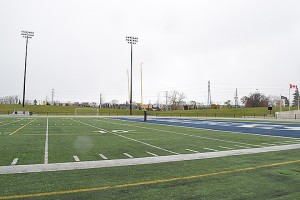Sleep is an important tool

The University of Windsor Stadium sits empty while Lancers players turn their attention to academics. (Photo by Dylan Fremlin)
By Dylan Fremlin
No matter what sport is being played, sleep is considered an essential weapon for success, but according to a Windsor Lancers quarterback sleep isn’t always easy to attain.
In spite of the importance of rest, some athletes do not get as much sleep as they should prior to games. Many athletes can run on adrenaline and adrenaline alone, regardless of their sleep or lack thereof. A quarterback for the Windsor Lancers, Casey Wright, said anxiousness can interfere with an athlete’s sleep patterns.
“Trying to go to sleep earlier is next to impossible,” said Wright. “When I start thinking of the game I get a second wind and it takes hours to fall asleep.”
Wright said a lack of sleep does not seem to hinder his performance because of adrenaline. He also said he uses caffeine prior to gain more energy, which helps him balance a lack of sleep.
Since football is a physical game, if a quarterback is not alert he is more likely to get hit. A pass rusher’s job is to find a way to hit the quarterback throughout the game to wear him down and cause turnovers. Thinking about this can also cause stress and hinder the quarterback’s rest.
“When you start thinking of your opponent and your assignments in your quiet room at night it gets you excited and I become wide awake again,” said Wright.
A study in the journal “SLEEP” shows a general correlation between a decline in split-second decision making and poor sleep. However, this decline is not solely due to lack of sleep because there are many variables that come into play. To many, hydration and a healthy diet also contribute to an athlete’s performance.
According to a report by the World Association of Sleep Medicine in 2011, whether the problem be insomnia, obstructive sleep apnea, restless leg syndrome or sleep deprivation, sleep problems affect up to 45 per cent of the world’s population.
The report also indicated 30 per cent of Canadian adults get fewer than six hours of sleep per night as opposed to the eight hours experts recommend. According to a study done by the Weather Network in June of 2015, 61 per cent of Windsor citizens either frequently or occasionally suffer from sleeplessness. This is the eleventh highest percentage in Canada. This statistic does not affect all local athletes, though.
“Personally, no I never struggled to sleep,” said 26-year-old former Windsor Lancers wide receiver Tom Hicks. “I was so active that I could sleep at any time.”
Hicks suffered a torn anterior cruciate ligament, more commonly known as ACL, before his rookie season which derailed his career with the Lancers. Hicks said he had a pretty regular sleep schedule because of this.
Experts say one of the best solutions to sleep deprivation is to get into a regular routine and stick to it. Sleep can be used as a vital weapon for an athlete, although it is sometimes easier said than done.


